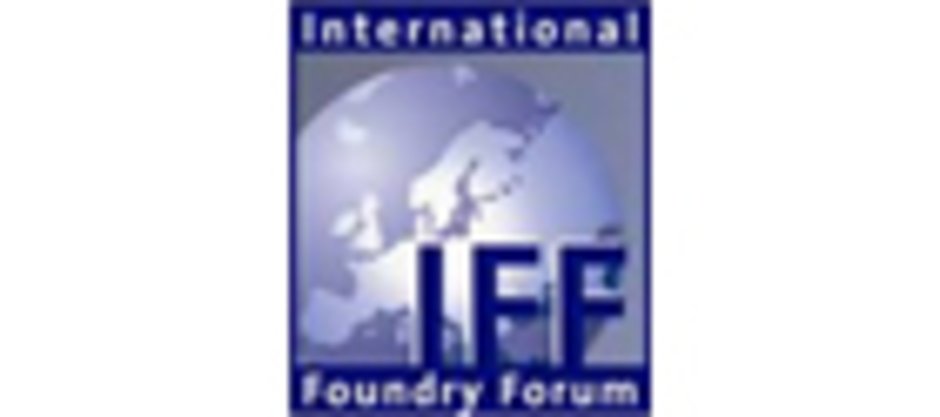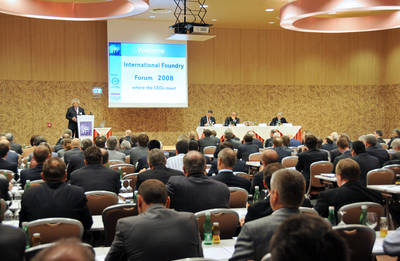“The climate change is the challenge for the automotive and engineering industry and its suppliers” Gabriele Galante, President of CEMAFON states. More than 220 CEOs of the world’s leading foundries and their suppliers from the mechanical engineering and foundry chemical products industry discussed with representatives of the main casting purchasers about future expectations, challenges and current industry trends at the fifth International Foundry Forum – where the CEOs meet – in Vienna on September ‘18-19, 2008.
|
The IFF is jointly organised by CAEF (The European Foundry Association) and CEMAFON (The European Foundry Equipment Suppliers Association).
The automotive industry presented challenging motor concepts and emphasized the impact on the future application of castings. Innovative answers for emission reduction and climate protection can be found by both alternative and traditional powertrain concepts, and: Castings are a flexible answer to the constructive needs of those new concepts.
The envisaged goals can best be reached by a sustainable cooperation along the supply chain, starting with the knowledge of raw and auxiliary materials suppliers and the expertise of foundry machines suppliers. This cooperation will reinforce the essential strategic partnership between the foundry and the automotive industry.
Representatives of different consumer branches clarified the challenges for the foundry industry, facing increasing demands. While casting requirements in the mining or metallurgical equipment industry need highly specialised foundries for castings of large dimensions, the windmill industry expects new capacities to be built to satisfy the still strongly growing demand. Also the message from the mobile communications as well as the automotive industry is clear: Rapid developments will require a high flexibility of foundries and a mix of materials will increasingly replace "mono-metal" solutions.
The mix of high innovative castings and a “globalisation driven” demand enables the foundry industry to resist the global economic slowdown to some extent. The figures presented by the representatives of the regional foundry organisations world-wide emphasized this statement. They made clear that the future requirements with respect to capacities, quality and delivery dependability will result in increasing efforts on the sector of research and development, education (training) and management.
Foundries in the volume segment which are efficiently managed and equipped with a modern machine park as well as suppliers of high tech casting components in the industrialized countries will have good opportunities in the future. An even stronger cooperation between supplier foundries and their customers will be a key success factor.
Another critical success factor has been addressed by Enrico Frigerio, President of CAEF: “Stable and viable energy and raw material prices as well as a strict cost management are crucial for the performance of the foundries”, he said.
A strict cost regime, highly efficient use of raw materials and energy are of tremendous importance, as well as research in this area. On the other hand, it is obvious that such enormous cost increases cannot be compensated only by cutting back on expenses and increasing productivity. The path chosen by foundries, which is to pass on these cost increases along the output chain and this without delay, is vital for the success of any enterprise.
<link _top>To see more pictures from the event please follow this link
| CAEF - The European Foundry Association Phone: +49(0)2 11 / 68 71 - 217 Fax: +49(0)2 11 / 68 71 - 347 | CEMAFON - The European Foundry Equipment Suppliers Association Phone: +49 (0)69 6603-1278 Fax: +49 (0) 69 6603-2278 |
E-Mail: <link>info@international-foundry-forum.org



